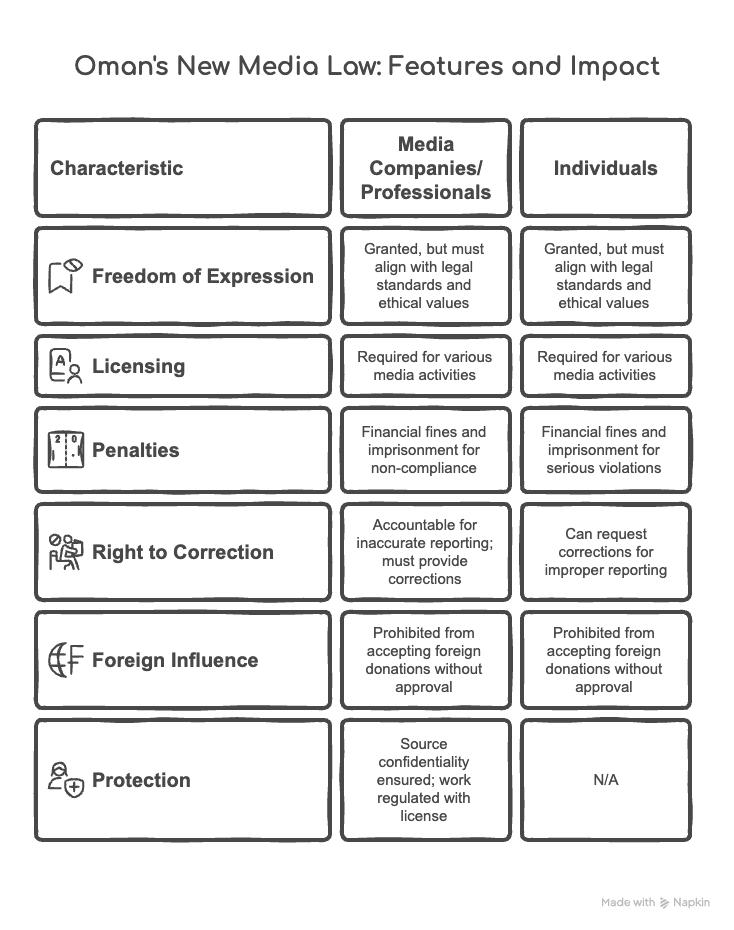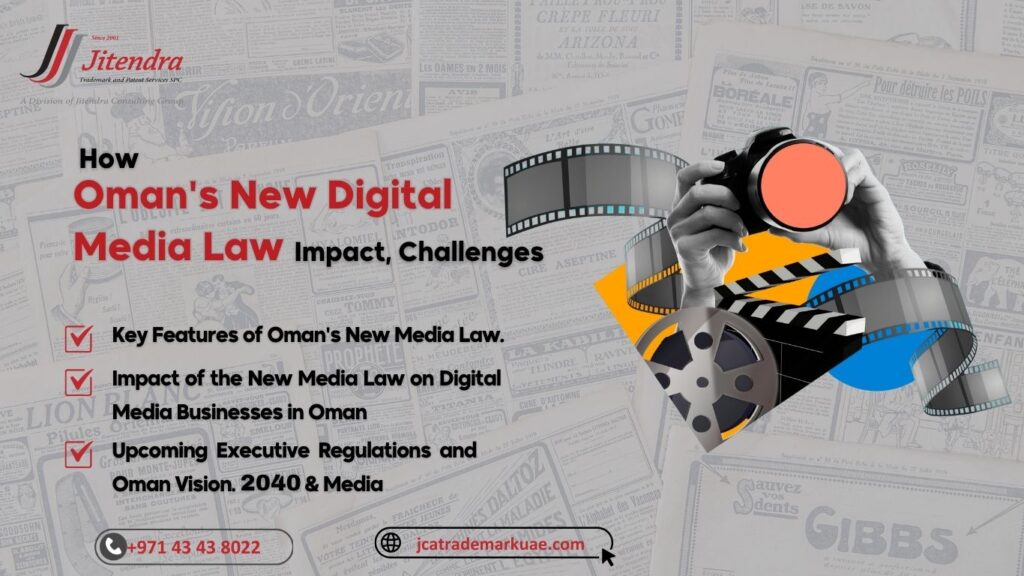Oman’s New Digital Media Law: Impact, Challenges, and Opportunities for Businesses
The Sultanate of Oman has undergone a significant legislative transformation in the media sector with the implementation of the new media law under Royal Decree No. 58/2024, which came into effect on November 11, 2024. This legislation replaces all previous media regulations and restructures and governs media activities and businesses throughout the country.
This ambitious law is designed to strike a delicate balance between freedom of expression and accountability. It aims to uphold ethical standards, safeguard national interests, and promote responsible reporting, while addressing the challenges posed by media regulation in the digital age, where distinctions between various types of content have become increasingly blurred. The law establishes clear guidelines for online news platforms, websites, social media accounts, and other digital mediums. Crucially, all digital media activities, including the management of news-related social media accounts, now require licensing from the Oman Ministry of Information.
Key Features of Oman’s New Media Law and Its Impact on Businesses
The new digital media law in Oman introduces a set of features and provisions that will reshape how digital media companies operate in the Sultanate:
1. Freedom of Expression in Omani Media: Balancing with Responsibility
The new law emphasizes media freedom in Omani media by granting media professionals the right to express opinions and share ideas freely, as long as their activities align with legal standards. It prohibits prior censorship, encouraging an open and balanced media environment. This approach reflects Oman’s commitment to respecting public opinion while honoring its cultural and ethical values.
However, this freedom comes with clear responsibilities. The law restricts the publication or broadcasting of content that could disrupt public order, interfere with ongoing legal proceedings, or violate ministry regulations. It also limits misleading and unethical advertisements, aiming to uphold high media standards. This balance seeks to ensure that freedom of expression is not used to harm national or social interests or incite discrimination.
2. Digital Media Licensing Requirements in Oman
This is one of the most significant and fundamental changes. Under the new media law, companies and individuals engaged in a wide range of media activities must obtain a license from the Ministry of Information (MOI). This includes:
- Traditional Media: Newspapers, audio-visual channels, publishing houses.
- Digital Media: Online news platforms, websites, management of social media accounts for news or commercial purposes, and the production and distribution of artistic and printed works digitally.
- Exemptions: Legal entities (e.g., government bodies) may be exempt from certain licensing requirements.
Conditions for Granting Licenses:
Licenses will only be granted under specific conditions, primarily the provision of a financial guarantee to ensure compliance with regulations. The law allows licensees to modify their legal structure, merge with other entities, acquire businesses, or transfer ownership, provided they comply with the specific regulations outlined in the law.
Content Prohibition:
The law strictly prohibits content that promotes bias or discrimination based on religion, sect, ethnicity, gender, or other factors that conflict with Oman’s core values.
3. Penalties for Non-Compliance with Oman’s New Media Law
The new law enforces strict penalties to ensure compliance and maintain the integrity of the media landscape. These penalties include:
- Financial Fines: For infringing individuals and companies.
- Imprisonment: In cases of serious violations.
These penalties aim to deter violations and promote accountability, emphasizing that both individuals and media companies are held responsible for any breaches of the law.
4. Right to Intervention and Correction
The law enhances the accountability of media organizations by granting individuals impacted by improper or inaccurate reporting the right to request prompt corrections. This provision fosters public trust and encourages effective and responsible journalism.
5. Restrictions on Foreign Influence and Sponsorship
To uphold the integrity of Oman’s media sector, the new law prohibits businesses and individuals in the media industry from accepting foreign donations or privileges without prior approval from the Ministry of Information. This measure aims to prevent foreign influence on Omani media, ensuring that national values remain central and well-preserved.
6. Protection for Media Professionals and Source Confidentiality
The new law mandates media professionals to secure a license, which regulates and protects their work within the industry. Additionally, the law ensures source confidentiality for media professionals, a crucial provision that protects their independence and upholds the professional standards of journalism. This further reinforces responsible and ethical media practices.

Impact of the New Media Law on Digital Media Businesses in Oman
The new digital media law in Oman will have multiple impacts on various types of businesses in the digital sector:
1. Social Media Agencies and Content Publishers:
These entities will need a precise understanding of permissible and prohibited content, and the new licensing requirements for managing news-related or influential accounts. They must ensure that any published content adheres to ethical and legal standards to avoid penalties.
2. Content Production Houses and Independent Digital Creators:
They are now required to obtain licenses for the production and distribution of their artistic and printed works digitally. They must ensure that their creations do not violate prohibited content provisions and comply with digital media regulation in Oman.
3. Online News Platforms:
These platforms will be subject to greater oversight, with the necessity to adhere to professional standards, ensure information accuracy, and respond to correction requests. New licensing requirements will be fundamental to their operations.
4. Financial Implications and Business Model Changes:
Licensing requirements and financial guarantees may impose additional costs on businesses, especially startups. Business models may need to adapt to ensure continuous compliance and avoid fines.
Overall, the law aims to regulate Oman’s growing digital media landscape, establishing clear foundations for responsible and professional work.
Upcoming Executive Regulations and Oman Vision 2040 & Media
The new media law in Oman represents a pivotal step towards modernizing media regulation, aligning with the aspirations of Oman Vision 2040 and media. However, the detailed application of many of the law’s provisions will become clearer with the issuance of executive regulations.
How to Stay Informed:
Businesses and individuals in the digital media sector must closely monitor the Official Gazette for any updates or new executive regulations issued by the Ministry of Information. Consulting legal advisors specialized in media laws and intellectual property in Oman is crucial to ensure continuous compliance and avoid any unintentional violations.
How Can Jitendra Trademark and Patent Services Support Your Business in Oman?
Jitendra Trademark and Patent Services stands as one of the leading business service providers in the GCC region, offering expert guidance for business setup. In the context of Oman’s new digital media law, our experts can assist you with:
- Digital media licensing requirements in Oman: Guiding you through the license application process, preparing necessary documentation, and providing required financial guarantees.
- Content Compliance: Advising on how to ensure your content adheres to illegal content prohibition provisions and ethical standards, to avoid penalties under Oman’s new media law.
- Business Structuring: Providing support in modifying legal structures or merger and acquisition processes in line with the new law.
- Media law consulting services Oman: Offering specialized consultations on all aspects of the new law and its impact on your business, ensuring full compliance.
Whether you’re looking to establish your company in free zones or mainland areas, we offer comprehensive services tailored to your needs. Our team of professionals excels at navigating the complexities of the setup process, including documentation and securing the necessary licenses based on your business activities. Additionally, we extend our expertise to visa services, ensuring a seamless experience for your business journey.
Frequently Asked Questions (FAQ)
What is Oman’s new digital media law?
It is Royal Decree No. 58/2024, which came into effect on November 11, 2024. This law aims to regulate all media activities in the Sultanate, including digital media, to achieve a balance between freedom of expression and responsibility, and to ensure compliance with ethical and legal standards.
Do all digital media activities require a license in Oman?
Yes, under the new law, all digital media activities, including online news platforms, websites, news-related social media account management, and digital content production, require a license from the Oman Ministry of Information.
What types of content are prohibited under the new law?
The law prohibits the publication or broadcasting of content that disrupts public order, interferes with ongoing legal proceedings, violates ministry regulations, or promotes bias or discrimination based on religion, sect, ethnicity, gender, or any factors that conflict with Oman’s core values.
What are the potential penalties for violating Oman’s new media law?
The law imposes strict penalties on violators, including financial fines and imprisonment, applicable to both individuals and media companies, to ensure compliance and maintain the integrity of the media landscape.
Does the new law affect freedom of expression in Oman?
The law seeks to strike a balance between freedom of expression and responsibility. It emphasizes media freedom and prohibits prior censorship but sets boundaries to ensure that expression does not lead to harm to national or social interests or incite discrimination. The goal is an open and responsible media environment.




